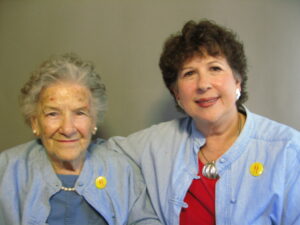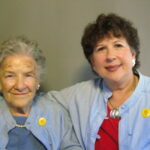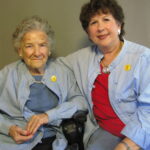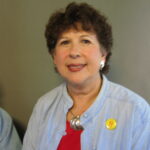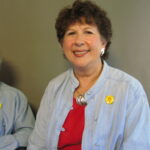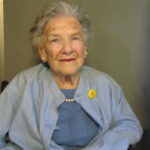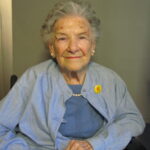Louise (Lucy) Robinson McReynolds and Ann McReynolds
Description
92 year old woman is interviewed by her 65 year old daughter about her family, growing up in Little Rock, Arkansas, and her career as a bookkeeper in St Louis.Subject Log / Time Code
Participants
- Louise (Lucy) Robinson McReynolds
- Ann McReynolds
Venue / Recording Kit
Tier
Keywords
- anecdotes (humorous but true stories)
- apendicitis; peritonitis; chilbirth
- birth of first child
- college
- Cotton broker; Logging industry; railroads; bookkeeping; Pitney Bowles; National Recovery Act (NRA); boarding house for working girls;
- Episcopal Church
- family characters
- family favorite songs and poems
- family heroes
- family naming and nicknames
- Family Traditions
- family trips and excursions
- Glacier Park, Montana;
- historical events/people
- hunting dog
- Influential People
- memories of growing up
- Money
- personal experiences
- piano
- Pine Bluff, AR;
- pregnancy and pre-natal care
- religious beliefs and practices
- school day memories
- sewing
- Spouse
Subjects
- Achievements and Awards
- Best Friends
- Children
- Coming Of Age
- Community Businesses
- Earliest Memories
- Extended Family
- Farm Life
- First Meetings
- Grandparents
- Hunting
- Illness
- Instrument Playing
- Job Satisfaction
- Marriage
- Parents
- Schools
- Siblings
- Singing
- Students
- Swimming
- Town Life
- Workday Life
- Workplace Characters
Transcript
StoryCorps uses Google Cloud Speech-to-Text and Natural Language API to provide machine-generated transcripts. Transcripts have not been checked for accuracy and may contain errors. Learn more about our FAQs through our Help Center or do not hesitate to get in touch with us if you have any questions.
00:04 My name is Ann Robinson McReynolds.
00:08 No, I am 64 almost 65 years old in February. Next year. Today is September 24th 2005 and I am in St. Louis at the Jefferson Memorial which is in Forest Park and the headquarters of Missouri Historical Society. I'm here today to interview my mother.
00:31 I'm the mother.
00:34 My name is Margaret Louise Robinson and I'm married Thomas James McReynolds the Third.
00:46 How old is Dora is an then we have two other children. Susan is 4 years younger than an.
00:56 And Tom is 608 years younger than a man.
01:02 Your age your age and I am now 92 years old, which I find absolutely.
01:10 Unbelievable, but I am and today's the 25th of
01:17 24th of September
01:21 And I'm with an at the Missouri Historical Society.
01:25 In Forest Park st. Louis
01:30 And she's my daughter and I and is my oldest daughter.
01:39 I want to start by asking you where you were born. And where you grew up. I was born in Little Rock, Arkansas on June 27th, 1913.
01:54 And we move shortly when I was 6 months old a family my father mother and I moved to
02:08 Camden Arkansas Pine Bluff Pine Bluff, Arkansas where my daddy had a new job.
02:16 And I grew up in Pine Bluff. I attended Pine Bluff High School where I was at a Plus student.
02:24 I hate to brag but that's the truth. And I found out later at high school reunions that the president of the class always sat behind me and all math classes and copied everything I ever wrote.
02:45 And he had a good memory so he could remember most of it but he wrote it everything down that I ever wrote and I made a pluses and that pool guy. I only met days cuz when he told me about that I said well Robert I didn't know you had been copying from me. He said all through Junior High and high school. I sat on the right hand side of your paper so that I can see what you wrote. Okay. So what were your parents like Mama your mother and father my mother and father would just loving couple.
03:28 And my mother was not very tall. She was 5 feet 4 and very slim and Street.
03:39 And Daddy was 5 feet 5 or 6.
03:46 And he was a little plump than my mother and I was little plumper than anybody else.
03:54 Which really didn't bother me much.
03:57 Like when I had a stepmother after my mother died.
04:02 It bothered the heck out of her that I was pumped.
04:06 Didn't bother me, but it seem to bother her quite a bit one of the rest of your family you were surrounded by a whole bunch of aunts and uncles and cousins on me and I had aunts and uncles and cousins wherever I went. There was somebody I was kin to somehow ever.
04:26 When I went to Glacier Park, we went to Chicago. When was that Mama? 1922. I was 9 years old. And why did you go to Glacier Park? Because my aunt Lorraine lived in Frazier Park, her husband had planted a bomb shell with the whole family by telling everybody that she was going to marry a man.
04:53 Sushiya Dairy adored his name was William, Butterfield.
04:59 And she was going to move with him to Glacier National Park where he was employed as a ranger.
05:07 Until you went out there to visit Aunt Mabel and Uncle Sam took me.
05:14 With them when they went to see Aunt Lorraine and why was the lucky one? I'll never know but I was the lucky one. Good got to go.
05:26 And I tell you would ride on that train from Pine Bluff to Little Rock and then from Little Rock to Chicago was a real thrill.
05:38 And the funny thing was that we had the same.
05:43 Man on the train from Little Rock to Chicago that we ended up with from Chicago to Glacier Park. So he knew exactly what I liked and didn't like you mean the quarter or the conductor the man on the train who the Brazil taken care of a food icing and Uncle Sam who was Aunt Mabel's husband.
06:13 And his name was Sam field.
06:17 And I ain't Mabel was kind of the guru of the family. She knew everybody's business and why anybody had any business?
06:27 And how they got it and what they did.
06:31 And
06:34 Aunt Mabel is the one who gave the bad news to him to my cousin Malcolm who confided in him in hole when he was 11 years old. He said I ain't Mabel and I want to tell you not to worry. I've decided who I'm going to marry and Aunt Mabel said honey you 11 years old. It's hardly necessary for you to tell me now about who you're going to marry but who is this lucky girl? He said oh you are well acquainted with her.
07:05 Is smarter Louise?
07:08 And I ain't Mabel said you can't marry her. She's your cousin.
07:12 So what we have the same name, it'll make everything a lot easier.
07:18 He said Robinson's a wonderful name. I'm proud of it. And there's another Malcolm Robinson off of Malcolm and I was named for him. I guess he said I said when you couldn't be named for anybody any better. He said that's true.
07:36 And now where did where did Malcolm your cousin Malcolm lives mama in Little Rock n k and his mother and his mother was my aunt Nettie, and she was the she was ahead of a dog Museum in Little Rock. But his his father was his father. Right and I had a cousin named littlebiggy, right? Well, he wasn't little you grew up playing the piano and so did eggy and that granddaddy always heard about all of his Caruso records. So how many pee and granddaddy used to sing and soda Uncle Williford and Soul music was very much a part of the family very much a part of the family and my grandmother Katherine Dillingham, Elda.
08:32 The father of my father and Uncle Williford was a musician. She played the harp.
08:42 And numb
08:45 She was evidently quite educated. I don't know how why but one time when I was driving Aunt Mabel.
08:58 Opal and Uncle Williford through Maryland. We went by some woman's college in Maryland and Uncle Williford said no, that's where Mama went to see you meaning Katie Dillingham Elder and I forgot the name of the school.
09:16 But I think I have that record but she lives in Woodville, Mississippi and then went back to Maryland to go to school because she was just a young girl. That's what did I tell you by the way that when I was doing research in the wood in Woodville that I found out that Edwin Robinson my grandfather your grandfather Edmond Robinson lived with his Census records were on the same page as the Elder Census records. So that means that the families live right next to each other. He lived there by himself. Will they will cousins know Kevin Robinson was not a cousin of the elders. He married Kate Dillingham Elder, but that's how he met her and they were right there in Woodville. And so what who called you, where did you get your nickname? Cuz you were called Margaret Louise by most of your family, but that's right, but who else called you nicknames when you were little
10:16 Well, my grandmother my mother's mother.
10:20 Who I called now. I'm of Demi Demi me.
10:30 She started calling me Molly Lou.
10:35 And pretty soon all my ads before I had a Gideon ass.
10:41 All started calling me Molly Lou on occasion. Well, that's a funny name and sew in it Hagee your sister. You called her cuz you couldn't say Agnes. Everybody called her Agnes and you called her what Oddish Oddish that's very strange. Very strange name and I always apologize for it cuz I couldn't say a Agnes worth of darn. Well, I never apologize for calling Louise Peezy. So in fact, I still call her Peezy sometimes so do I when you were growing up, did you have any pets? Did you get animals? Oh, yes. We had goats goats sheep.
11:22 We ate one of the sheet one time and I almost fainted when I realized I was eating that animal.
11:31 Sorry, bad cough. Did did you have to lie about Uncle Malcolm?
11:40 Malcolm Malcolm my father's older brother
11:45 Lived with us with our family
11:49 When I was a little child and he was a cotton broker. He he was a cotton broker. He bought and sold cotton.
12:00 Porsche remember that. I'm from Southern Arkansas where cotton was King.
12:06 And daddy specialized in trees and off of Malcolm specialized in Cotton the two main crops of Southern Arkansas. So but Uncle Malcolm was not married and he lived with us. He had his own room and you say he travels a lot and he traveled to New York a lot. We had a lot of customers.
12:33 And why he sold his cotton?
12:37 And that he bought and you said he used to bring you things from New York and he brought me beautiful things from New York one time. He brought me a
12:48 A little hat and a muff.
12:52 Made out of white ermine
12:56 And it had a little black touches he in there. I must have been kind of hard to wear that in a place where your ermine.
13:11 Garmisch, but I managed imagine your hands kind of got a little warm. It didn't get too cold there. No didn't get to never did get too cold. I have always known and everybody knows that that in the family that your mother died when you were not even twelve years old at Aggie was I was 11 and 1/2 and that she died of peritonitis which people don't die of today because we have bird noises anymore. I think they might get peritonitis, but then they can kill it with antibiotics. And so your mother had a ruptured appendix and then she they found out she had peritonitis and tell me about how you moved into Uncle Malcolm's house with an anime after he got wear when in the meantime Uncle Malcolm had married a lovely young woman named Anna Mae Wilson.
14:06 And she had a mother who my call Mall Wilson.
14:11 And that her request
14:15 And
14:17 She was a lovely lady.
14:21 And I thank heaven. I have a picture of her.
14:25 Until I can remember exactly how she looks she always look like a million dollars.
14:31 And she was Charming.
14:37 And after my mother died.
14:40 She did all in her power to make me a lady.
14:46 If you can call what I am a lady or Mama, you're very ladylike ever so he is so she is really responsible for my behavior. Be responsible for somebody else's Behavior know by the time you're 92. I think you can be responsible for your own. It's okay. Well, I guess I am when you were growing up, was there any discussion about what you would be when you grew up o sure I was going to be a concert pianist you were.
15:22 Well, I had the talent and I had the opportunity.
15:27 And I also had
15:31 A scholarship to the University of Arkansas in the piano Department. Thanks to a Mabel.
15:41 And
15:43 But I couldn't accept it because we'd simply had no money. So this was a 1931 when you got out of high school, right? And so you had to work to help support the family. I thought that you said something about granddaddy had some hunting dogs that he had to sell.
16:02 No, they couldn't keep them during the Depression daddy and Uncle Malcolm had a very important.
16:11 Duck dog a dog who could find dead Ducks anywhere. His name was Frank, and he would love a pointer.
16:27 Beautiful dog and Iggy and I played with him like he was one of the family we always could instead of him to be our dog, although nobody else so it's at
16:41 But that was that was a main pet was Frank the dog.
16:47 So when you got out of high school and you had to go to work and that you went to work at the bank there in Pine Bluff, and no, let me see. Where do I go to work? You were in Camden by then know you were still in Pine Bluff?
17:03 You worked at the bank and then after that.
17:06 You work from Mary McLeod?
17:11 At the lumber company
17:13 I believe I work from Mary McLeod after I got out of high school and he taught you how to do bookkeeping and he said I knew so much about math course, but I really knew about was Alger from which is doesn't help you and bookkeeping, but that's alright.
17:35 So I learned how to keep books.
17:39 And how to make a statement and all that foolishness
17:44 And thanks to Mary McLeod. I ended up as a bookkeeper for the rest of my employee days when you work from Mary McLeod you this was a lumber company and you said you talked about learning about the railroads and how the railroads transported lumber from different places throughout Southern Arkansas in something about the NRA which was the National Recovery Act. Okay, and so, why did you learn about that?
18:21 The National Recovery Act was called the Blue Eagle.
18:26 Don't ask I don't know I forgotten.
18:30 Time Marches on and so does my brain evidently?
18:35 But
18:43 I learned about the NRA because I was working for a
18:48 The man who was running a sawmill in other words, we would get logs in and then they was sewed up and blow dried my air and then would kill dried after that.
19:06 And we ship them all over the country.
19:10 And so I had to learn about
19:16 What was going on in the NRA?
19:20 The National Recovery Act which was a very complicated thing and they were minimum wages that had to be paid for doing this at in the other and I found out that we were not doing what we should have done. So I kept my boss out of trouble by telling him what I knew.
19:42 And that that is the way that people all over the dog going country ended up calling me.
19:50 Calling out company in asking for me by name because they had heard that I knew all about the NRA as it had to do with manufacturing Boards out of logs.
20:09 And so then and then you had something to do with routing the trains are making sure that the trains came through that was another time. Okay. That was something else I did. All right. That was when I moved to see me. Okay. So how did you get to St. Louis? Well
20:28 When I was in Arkansas, I ended up working on a bank.
20:34 For $25 a month.
20:38 Now this is not a living, but he just anybody with any sense would know.
20:44 But I finally got raised to $50 a month.
20:50 Which I thought I was rich.
20:54 And then I was a man in St. Louis heard about me and my knowledge of the National Recovery Act and came to Camden to talk to my father about letting me come to St. Louis.
21:13 To work for him and run his office and that's because you knew had knowledge of the railroads in the train in the in the in the lumber and how it was shipped. Yes. So that was mr. Farquhar missed a follicle.
21:30 Was a Scotsman by verse and a very nice man for whom I worked.
21:37 And he
21:40 Paid me $125 a month.
21:44 Which was considered outrageous?
21:49 And that was in 1930 in 3636 is when you came to St.Louis and you lived at the Queen's daughters. I moved to the Queen's daughters, which was a
22:00 Catholic I'm going to say girl. It meant unmarried women.
22:07 Live there and it was like a residence hall and it was a residence hall. I had my own room.
22:15 And some of my own Furniture which my stepmother had bundled up and sent to me and Aunt Mabel sent me my mother's dresser that's wrong. It was my grandmother's dresser that came from France.
22:36 And it has three bold drawers, which is very unusual.
22:44 So presumably it's worth a lot of money. I have no idea. Well, so you lived at the Queen's daughters and tell us the story about how you when you first had dinner downstairs in the dining room and you first night you were there before so I was signed to a empty chair.
23:08 At a table for four and one of them's one of the people's name was an
23:16 Ridgely
23:19 Who later became my best friend?
23:22 And then there was another one stale London.
23:27 Who is also my good friend?
23:30 They didn't like each other but that didn't make any difference to me. I like them both and who else was at the table and there was a woman from South St. Louis. I never did really know her name the whole name.
23:46 I don't even remember her first name now, but that first night you went down to dinner and was the first night. I went down to dinner. I said to this other person I said, would you please pass the butter?
24:04 And she looked at me and she said bada bada. What do you mean butter? Do you mean butter? And I said no I said butter.
24:15 Hand and spoke up from across the table and she said can't you understand a Southern accent when you heal one evidently this woman had never heard of southern accent. So she thought I was ignorant.
24:32 Nan said just passed her the butter and let it go at that. I'll talk to you later, which she did in Spades and I was born on India's birthday and was named for her then and my daughter and was born on February 24th, which was an Winslet's birthday. And of course we name the info and wenzlick, but she was in she was in Ridgely and she didn't become intimate Slick still years later. That's right when
25:07 When after I eat you and Daddy met and and and and even introduced you and Daddy and how how difficult was it or how did trying to get married during the Depression affect what you were getting married? I mean tell us a little bit about how kind of wedding and so forth. Unfortunately, I couldn't get married in the Catholic church, but cause I was marrying a man who had been divorced.
25:40 My husband to be had been divorced when he was 16 years old. He had married a girl in his class when they will both 15 and of course it didn't have a chance to develop into a real marriage. So he ended up getting a divorce to which she agreed.
26:04 And
26:06 And I agreed to marry him so we couldn't find a Catholic Church that would marry us because he was divorced.
26:14 So I saw the Episcopal Cathedral one day in St. Louis and I went in the side door and spoke to the
26:26 To the dean the dean of the cathedral
26:31 And he said well, of course, I'll marry you.
26:35 And he did he perform the ceremony now daddy couldn't come to the wedding and I've always really my Uncle John.
26:45 My brother John because
26:50 My stepmother was getting ready to have another baby who turned out to be John Robinson my half-brother.
26:59 So it was John's fault that they didn't get to my wedding, but he send his blessings and one thing and another and we've lived happily ever after thank God. We've been married now for 65 years, which I think is what you called really taken. It's lasted a long time. That's a good adjectives to use when so you and Daddy were married and you just had immediate family there at the Cathedral right? And were you married in the Nave of the church or were you know, we were married in the
27:40 Lucas a little chapel in the toilet while set and so we just stood there by The Altar and we're married by the name of the cathedral.
27:55 Which was a lovely ceremony. The only thing missing was my father right should have someone walk you down the aisle. No, I just walk myself. And what did you wear and I made myself a blue dress or blue.
28:11 Silk dress
28:14 Which I thought was quite fetching and I had a blue.
28:19 Hat that look like flowers. I remember seeing that.
28:25 I remember seeing that now it looks old-fashioned and tacky. But if it was nice this time, I'm sure it was quite lovely it was okay, right. So you and Daddy were married on Groundhog's Day February 2nd the only day we could both get off work at the same time. Oh, I never knew why it was that it was that day had nothing to do with groundhogs had nothing to do with the groundhog.
28:52 We just shared his day. I see why it was nice day this year. So it wasn't too long before you found out that I was going to be born because I was born a year later and 1841. So you were working and Daddy was working and you found out you were going to have a baby. And what was your reaction Tara?
29:21 I just didn't know what we would do daddy didn't make a lot of money and I made more than money than he did which was not the usual way of things, but that what happened at that time.
29:36 I was very good at what I did.
29:40 And was well paid for it. So you all lived in the city on Wheel cavity or Cates. We lived in 5904 Cates Avenue and little-bitty apartment. And so shortly thereafter after I was born what you said something about the first thing that went through your head after you saw me I asked for my lipstick.
30:07 And the doctor said what do you want your lipstick for? I said, I don't want this baby looking up pay your face mother. I want her to see me. Like I usually am I sexy so well, so after how many how long did you work until I was born how long not very well. Well you took off a few before I was born you took off a month or six weeks or how how long could you work when you were pregnant for quite a while?
30:42 While I was pregnant, but I had a good boss. He didn't have I walked by had the baby that the office. Oh I said he wanted me to bring the baby to the office and he was willing to give up part of his Office Space 2.
31:03 Make a nursery fan if I would bring the baby to work with me.
31:09 Of course, I wouldn't do that, but it was nice of him to think about it.
31:16 And I thank him profusely, but he paid me very well any part of my money. He paid me himself.
31:25 And most of it came from the company the company was Pitney Bowes. Oh, that's right, Tell that story about when you had an opportunity to work either for Pitney Bowes or for us new soft drink company. And how did that how did that come about? Why didn't you go to work for the new soft drink company? I didn't go to work for the new soft drink company because I'm devoted to Coca-Cola. I mean, you might call it an obsession.
31:57 And no I couldn't imagine anything taking Cokes place and I figured the dog gone thing would never get off the ground, so I didn't want to go to work for him.
32:09 No matter what they were paying cuz I didn't know how long they'd be able to pay my salary and that company turned out to be royal crown. Right? Right, so they did stay around but they still you were right when you said you didn't think they'd ever really be able to compete with Coke. That was a that was probably a pretty good judgment when I was a baby you and Daddy used to sing songs to me and then and I know we used to play records and I there was always a lot of music when I was a child and
32:43 Did for some of the songs that you sang to me with these songs that you remember when you were a child by baby mudding Bye Baby Bunting Daddy's Gone off Hunting going to kill the rabbit skin to wrap the Baby Bunting in that's good song and I also remember though that there was some controversy about how you used to sing.
33:14 Go tell Aunt Tabby Go tell Aunt Tabby and daddy used to say Go tell Aunt Rhody and you all used to argue about what who the ant really was and I have never been able to figure out that was Abby and me is from Kentucky and Tommy is dead. My father. Tommy is my husband and father and he goes on the theory that everything from Kentucky is just wonderful and if it came from walking, so it's not so red hot.
33:49 Well, that's a pretty normal kind of a I guess chauvinistic approach. I guess that anybody would have but I always heard a tabby and he always heard Aunt Rhody doesn't make a bit of difference. Whatever way you sing it. It's the same song.
34:08 Just what the name of the person is doesn't make any difference either and it was a song about the got the goose and the old Grey Goose is dead you
34:19 Remember, I'll go tell Aunt Tabby Go. Tell Aunt Tabby Go. Tell Aunt Tabby the old Grey Goose is dead.
34:28 Daddy in the barnyard. I don't have forgotten man died in the barnyard and the goslings are Weeping and the gander is is something rather because their mothers dad or something like that. I don't remember but it was a rather mournful song to sing to a little child and I do recall that and that there was always the same when you would say it would be go telling it Tabby and when Daddy was singing it was Go tell Aunt Rhody just reminded me that everybody who knows you calls you Lucy Lucy, but your name is Margaret Louise Robinson McReynolds. And so where did Lucy come from where Lucy came from the fact
35:14 That I had to choose according to the
35:18 When I started to open up an account at the
35:23 What was then called? Ascentia Bank First National Bank of st. Louis?
35:31 I was going to open an account. And when I said my name was Margaret Louise Robinson the tell almost fainted. He said you got to choose one of the two names. You can't have both names. Nobody will call you both names. I said why not? He said we don't call people to know you're not in St. Louis. You're not in St. Louis. He said we call people one of the other so you chose Louise because that was what your mother was called. I chose Louise because my mother was always call Louise, although her name was also murdered. At least now the Margaret came from the Queen of Scotland.
36:16 And the Louise came from an ancestor.
36:22 Oh you mean the Queen of Scotland was not our ancestor Margaret was Margaret McCorkle, wasn't it?
36:29 Margaret McCorkle was your great-great-grandmother. Yes, and she was named for the Queen of Scotland. That's nice person to be named for Mama. How do you sync weight? Let's get back to Louise. So you chose the name Louise. And so then you went by Louise and then how did Lucy come out of it? Well, when I said that I had chosen Louis use instead of Margaret. Don't ask me why I just did.
37:01 Then you met daddy that I was talking to Tommy and I said now I'm drop the Margaret. I'm just plain Louise. He said well, I've known a lot of Louisa is in my life, but I never want new one like you and I don't think Louise suits you worth a darn. So I'm going to call you Lucy. I said what it's all right. I don't care what you call me. As long as you keep calling me. So he said I will and I do okay. And so I said, okay, but mama there's a question that they they act like people to ask in storycorps and want in this one is kind of a generic question and I just
37:47 We haven't talked about this how has your life been different from what you imagined it would be.
37:55 To be absolutely truthful. I cannot remember as a child.
38:01 Thank you for my life would be accepted. I was going to be a a Pianist of some kind.
38:10 I was very talented as a child. I learn to read music before I could read words.
38:19 I was four years old and I could read music. That's pretty early and I was the most important person in your life. Mama. I would say my daddy. Okay, and why was that decent? I just worked up my father.
38:35 Piano from Malcolm more like Twin Falls to me.
38:41 You never saw one that you didn't see the other.
38:45 They went hunting and fishing together. They will always together.
38:52 And when Uncle Malcolm
38:55 Got married and built his own house. I thought he had deserted us.
39:02 Because he had lived with us for so long. I thought he belonged in that bedroom, right and then all of a sudden I was in that bedroom my sister and Iowa.
39:13 And
39:16 Then when we moved our
39:19 Twin beds in there and eggy threw the shoe at me that night when I let out this scream daddy came rushing in the room thinking that I've been killed by bears something.
39:34 He said what's going on in here? And I said daddy she threw a shoe at me and he said to Aggie. Why did you throw a shoe at your sister? And she said Daddy look at her she has an apple in her right hand and she holds it above her head and every once in a while. She pulls it down enough to take another bite out of it. It just drives me crazy and daddy so I can see how that would be a very annoying Margaret Louise put the Apple down.
40:06 But Daddy, I haven't finished it. You can finish it tomorrow. I said it won't be any good. He's so then you can get another Apple.
40:14 I said, okay. It's so I put the Apple down. We've been hearing this story for years and I must say it's never changed mama. You have always told it exactly the same and Aggie when she was alive. She agreed that that's what it happened. But I want you to know that none of us can understand it. It makes no sense. We can't figure out why it upset Agee and we don't know why he would hold an apple above your head. But that's a story that we have heard our entire lives. Is there anything else that you want to tell me that in a minute or so we have left that we didn't talk about that. You've never told me of something that just has come to you that you've never said I can't think of a thing honey. Is there anything you wanted ad about?
41:02 Anything that I know but I just worked with my little sister. I just worship daggy why I know you did you always took care of her. She and I were good friends.
41:15 And I saved from drowning one day in the Saline River.
41:22 We were we both had.
41:26 Inner tubes and I looked over and I saw a g with her head underwater and those brown eyes wide open and her mouth wide open. So I ran and grabbed her and pulled up to the surface hit on the back and scream for Daddy and he came running and I said she's trying to swallow the roof.
41:51 And daddy picked up and got the water out of it and he said no, you're not supposed to swim with your head under the water. You keep your mouth out of the water.
42:08 And you don't want to swim.
42:10 Write your mouth open because it's dangerous. You're liable to drown.
42:16 And I guess his first round. He said that she said he said you don't want to know what's ground. You just listen to me and don't do it anymore swim with your head above the water.
42:32 I'll try she said I guess you had to swimming Rivers cuz there were no swimming pools North women for the right. Well, I think we're about through and they're going to ask us to wind this up. So this has been a very very interesting few minutes and I've heard some couple of stories. I don't think I've ever heard before which is just amazing as much as you talk. I have never heard some of those stories. So I think this was fun. I'm glad we did it and I'm hope that you're glad that we did it to I thought you wanted to talk about.
43:11 Montana what you said you talked a little bit about that about when you went to Glacier National Park. Yeah, you told us about how you went. I didn't realize you'd gone with an old Aunt Mabel and Uncle Sam. I thought you were by yourself, but no but Uncle Sam had made a friend of the weight on the train.
43:32 So by the time we got to Montana the weight of new everything I knew and I knew everything the way honey do it was a lovely trip and I something I'll never forget if I live to be a hundred. Well, that's a few more years from now that I have made a pretty good start on it. I guess you have all right.
